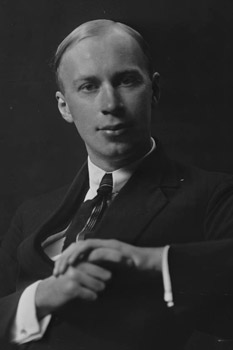
Biography
At the age of six, he composed a cycle of short piano pieces, and aged nine he wrote a children's opera. From 1902, he studied composition with Reinhold Glière. In 1904, he enrolled at the Petersburg Conservatoire where he studied under Rimsky-Korsakov (instrumentation), Anatoly Lyadov (composition), Jāzeps Vītols (music theory), Anna Esipova (piano), Nikolai Tcherepnin (conducting). While still a student at the Conservatoire, he started giving concerts. He completed his studies at the Conservatoire as a composer (1909) and pianist (1914). For his finals in the latter discipline, he played accompanied by orchestra his First Piano Concerto for which he received the prestigious Anton Rubinstein prize.His early works, as well as his performances as pianist, showed him to possess an original talent, boldness and the innovative thinking of a major artist. The freshness and dynamism of the young composer's music made a striking impression and it aroused fierce argument. In this period, he wrote the Classical Symphony, the Second Piano Concerto, the piano cycles Sarcasms and Visions Fugitives, the ballets—to commissions from Diaghilev – Alla and Lolli (1914, under the title The Scythian Suite, 1916), and Chout (or The Tale of the Buffoon, 1915), the opera The Gambler (1917), commissioned by the MariinskyTheatre.
From 1918–1932, he lived abroad, where he toured as pianist and composer in France, Italy, Spain, England, Belgium, America. He wrote the operas The Love of the Three Oranges, which received its first performance in 1921 in Chicago, and The Fiery Angel (1927), and also the ballets Le Pas d' Acier (1925) and The Prodigal Son (1928), commissioned by Diaghilev. In the same period, he wrote his Second, Third and Fourth Symphonies, three piano Concertos and many other works.
In December, 1932, he returned to Russia. Here he wrote his famous symphonic tale for children, Peter and the Wolf, and music for theatre and Cinema. His works for this period include the ballets, Romeo and Juliet (1936), Cinderella (1944), Tale of the Stone Flower (1954, after Pavel Bazhov), the operas, Semyon Kotko (1939), Betrothal in a Monastery (1940), War and Peace (1941 –1943), Story of a Real Man (1960, after Boris Polevoi) music for the films Lieutenant Kizhe (1934), Alexander Nevsky (1938), Ivan the Terrible (1945) the Fifth, Sixth and Seventh Symphonies, the Oratorio On Guard for Peace, the Winter Bonfire suite—to verse by Samuil Marshak, and much else.
He died in Moscow on 5 March, 1953.
In 1991, the 1st Prokofiev Competition for Young Musicians took place, since when it has become a yearly fixture.
He was awarded a Lenin Prize and six USSR State Prizes for his music. He was elected a member of the Academia Santa Cecilia, in Rome, of the Umeleska beseda Association, in Prague, of the Royal Swedish Academy of Music, and he was awarded the gold medal of the English Royal Philharmonic Society.



